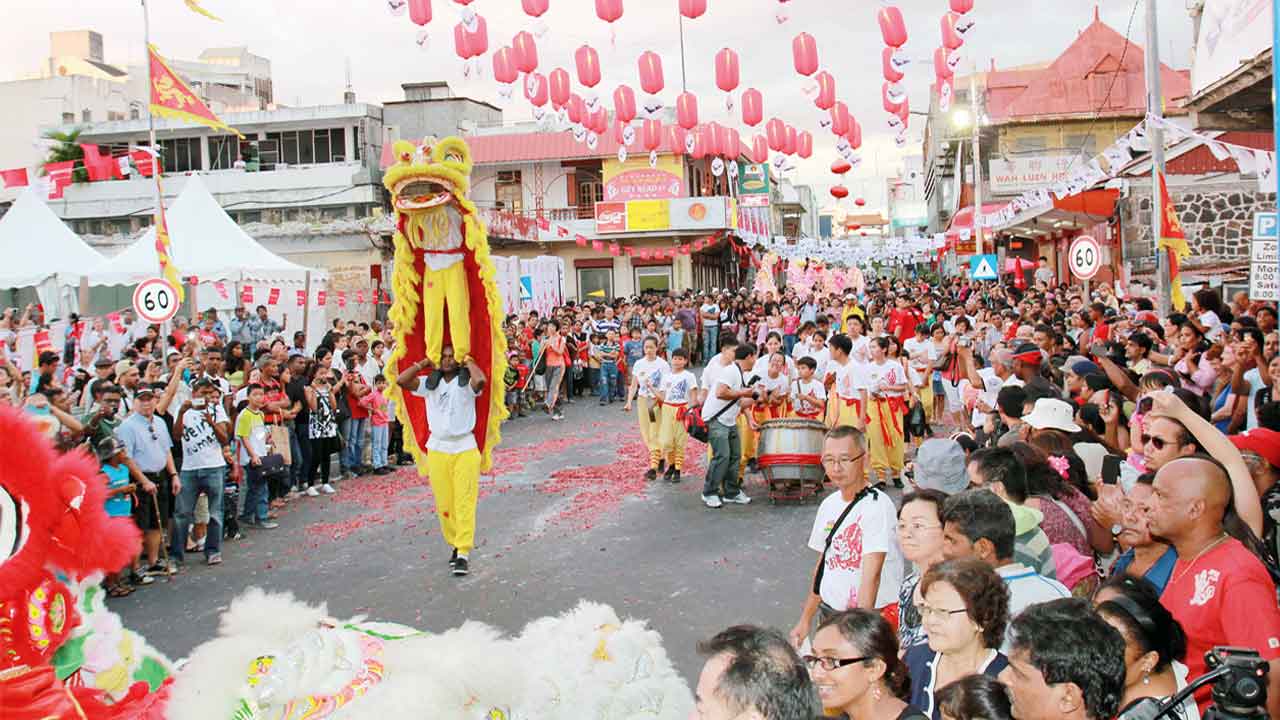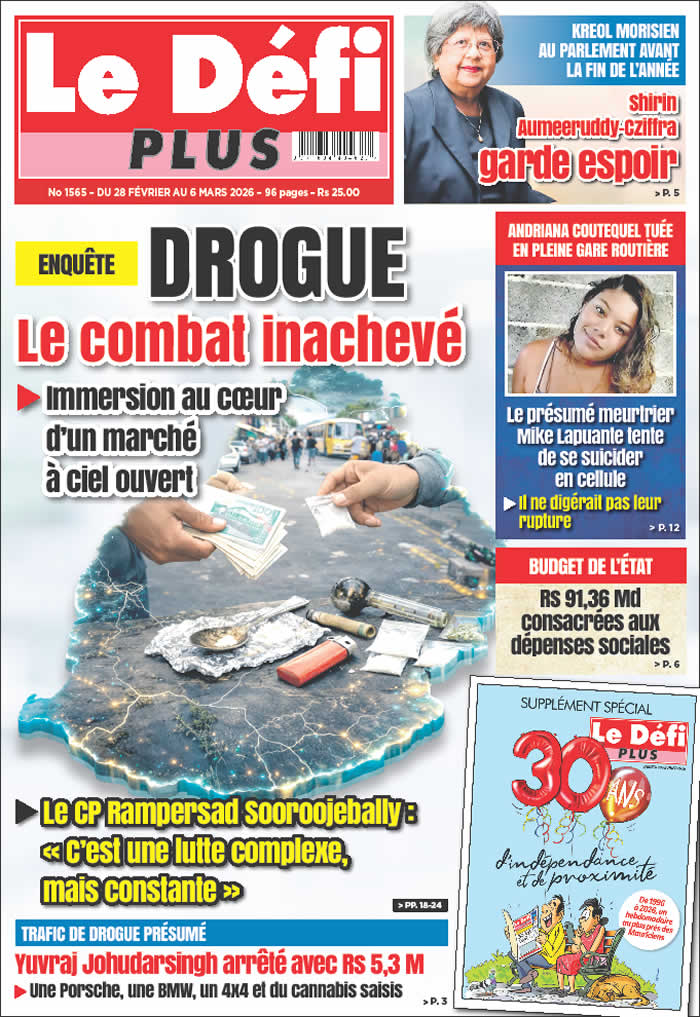
Before the installation of the communist regime in China on 1st October 1949, the first generation of Chinese who came to Mauritius wanted to make money here and go back to China to spend their old age. The arrival of Mao Zedong changed their plan. They decided to reside definitely in Mauritius.
Even if today the Chinese community has regressed from 3% at the time of independence in 1968 to a mere 1,8% – especially after the massive immigration of the last 30 years mainly to Canada and Australia – Sino-Mauritians constitute a homogeneous group of the Chinese Diaspora in the Mascareigne region. Nowadays, with the emergence of Red China as the second economy of the planet after the United Estates, exporting its labour and finance to develop the African continent and to do business, Mauritius too is experiencing a new drive with several Chinese businessman expatriates taking advantage of the hiving off of the original Mauritian Chinese in the other regions of the Mascareigne particularly in Seychelles, Reunion, Madagascar to develop some sort of linkages. There is now a much more cultural exchange amongst the Chineses of the sub region. Those Chinese – called Fah Kiao, in Hakka and Hua Qiao in Mandarin – are the subject of an essay written by Mr Joseph Tsang Mang Kin entitled “Hakka and Huaren Destiny”.
The first generation of Chinese came to Mauritius in the late 1930s, in between the two World Wars 1914 and 1945 to seek fortune. They exiled themselves in the countryside to run small shops in an inhospitable environment where they have to learn the creole and bhojpuri languages in order to converse with the Indian labourers and the Creole artisans.
For the past one hundred years, the Chinese shopkeepers played a crucial role in the retail trade by providing the basic necessities of life and the staple food on credit to the inhabitants. The latter paid their arrears during the harvest season. Chinese shopkeepers created a system of micro credit with the “carnet laboutik” selling goods on credit. Today, with the phasing out of the Chinese shops in the countryside, this red notebook constitutes a relic and forms part of our history at a time when the country was depending exclusively on the monoculture of sugarcane for its foreign currencies.
With the accession of Mauritius to the status of sovereign State, fearing that they might become stateless, they responded massively to the call of late Sir Seewoosagur Ramgoolam, inviting them to get naturalised as citizens of Mauritius.
Today, with the passing away of most of members of the first generation of Chinese immigrants, and the massive emigration the second generation to Canada and Australia to settle with children who have obtained their permanent residence, the Chinese shops in the countryside have disappeared one by one or are being taken over by Mauritians of Indian descent.
Mauritian Chinese who stayed here have adapted themselves to the new trend of living. Many of them have converted their small shop to snacks and hotels or provide catering services. Several members of the Chinese community have invested in the food distribution sector and are now doing quite well. Over the years, many of Sino-Mauritians have known social mobility and have become professionals in the field of medicine, accountancy, engineering, legal, etc.
It is interesting to put on record the contribution of the small Chinese community in the economic. social, cultural and historic fields of Mauritius. The Chinese way of life has in a way influenced our multi-cultural society. Chinese cuisine has become an integral part of our culinary landscape. Every year, the Chinese Food Festival attracts an important gathering in China Town.
Chinese cuisine, which now forms an integral part of Mauritian cuisine, bears testimony of the integration of the Chinese community in the country. Every Mauritian, whatever may be his origin, appreciates Chinese cuisine, eats fried noodles, dumplings, chopsuey, Pekin ducks, etc. The Chinese martial arts: wushu, kungfu and Taichi Juan are no longer an exclusive practice of the Mauritian Chinese. Many non-Chinese are now practising these forms of martial arts. Dragon and Lion dances are common features of our cultural landscape.
Firecrackers which are engraved in the Chinese culture have been transmitted to other communities. Nowadays, every Mauritian is fond of firecrackers, be it New Year, Divali and Christmas. At this time of the year, every Mauritian is keen to know under which Chinese zodiac sign he or she is born. The art of living in harmony with one’s environment Feng Shui (water and wind) is being adopted by Mauritians of diverse origins.
Resourcefulness is a common trait of Mauritians of Chinese descent. It has been shown during the last world war when Chinatown of Port Louis was a booming place for the thriving of a cottage industry in Mauritius. During this dark period, when the country was living in dire conditions because several cargo vessels could not supply goods from abroad for fear of being torpedoed by German warships, the inhabitants of China Town transformed their houses into a beehive producing lots of articles: wine, vinegar, noodles, biscuits, shoes, garments, sweets, candles, in short anything that the country needed. China Town will remain engraved in the memory of a generation of Chinese as the cradle for the beginning of the industrialisation of Mauritius.
In this journey in relation the history of the Chinese Diaspora, we have tried to situate the Chinese presence in the multiracial society of Mauritius in its true perspective. Mauritius today has experienced an indepth mutation. The Chinese community, in its majority, like other communities of our rainbow Nation, is facing a process of deculturalisation and the loss of ancestral values. The young Chinese are losing their “tongsin” (Chineseness), that is their Chinese identity. Many young Chinese have lost their benchmark. Is it their fault or that of their parents who have favoured their occidental education in a society where competition is privileged at the detriment of cultural values inspired by Confucius, whose way of teaching is based on the Chinese civilisation? Those ancestral values are: filial piety, respect of the elderly, the promise given to somebody, the respect of the law, the way to behave in society, the love to do one’s work, etc.
The Chinese identity has no price. The day the Chinese community would have lost its identity, we will have to bury our multilingualism and our multiculturalism. Another challenge which is facing the Chinese community is that in a few years’ time, it might become as dead as the dodo. Nowadays, most of the third generation of Mauritian Chinese who have left Mauritius to study abroad do not want to come back and work for the country. Many parents are now living alone in their old age. This problem has become so acute that there is an urgent need from the community to devise ways and means to tackle the problem of old age and those elderly persons living alone and in destitute conditions.
By Roland Tsang Kwai Kew
 J'aime
J'aime














